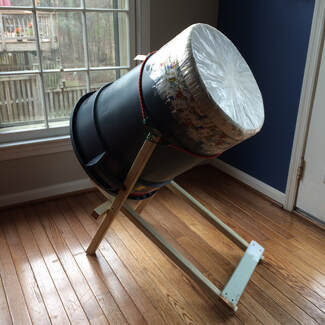 "Gomi-daiko" or practice drum made from a trash can - sitting on a homemade naname stand made from scrap wood "Gomi-daiko" or practice drum made from a trash can - sitting on a homemade naname stand made from scrap wood As cherry blossoms burst forth on trees around the Washington DC area, Nen Daiko and Dounen Daiko are reminded that normally we would be performing taiko at many events. That's not the case this year due to the COVID-19 pandemic, with all events cancelled and everyone doing social distancing. But that doesn't mean we aren't playing taiko because taiko is such a big part of our lives! Members of Nen Daiko and Dounen Daiko have been practicing at home on our gomi-daiko (trash can drums), drum pads and pillows. We have been meeting regularly to stay connected as performers and friends. How is Nen Daiko Practicing?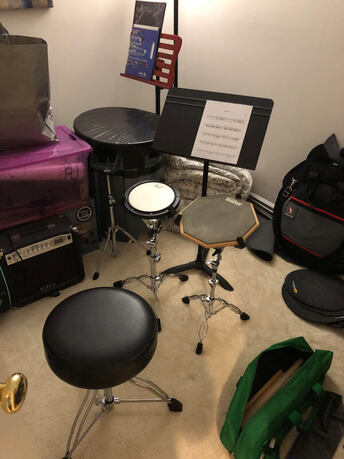 Home practice space of a Nen Daiko member Home practice space of a Nen Daiko member Within the first week of social distancing, members of Nen Daiko put together song-specific work-outs. In addition to everyone's personal physical conditioning routines, we set a shared physical challenge goal that we aimed to do at least 2-3 times per week. These have included:
We choose three activities per week to keep the goal more achievable. How is Dounen Daiko Practicing?Dounen Daiko is our teen group, and we have been doing our practices virtually for one hour every Sunday. Our goals for this practice are to work out together, as well as connect and have fun. While Zoom and similar technologies are incredible tools, they are not great for playing taiko together due to the lag time in all our internet connections. When we trying to play together, it creates a cacophony! Our style of taiko playing is called kumidaiko, or playing together, so we keep bumping up against this technology as we practice. We have adjusted our playing to have everyone on mute and just play in each other's company (but not practicing timing). We also play one at a time - for example, each person plays one line of a song, and then the next person plays line 2 etc. Part of our warm-up is "oroshi" meaning we play to a metronome that gradually speeds up. The first week, we put the metronome beside one person who unmuted, but even then the metronome would slow down and speed up based on that person's internet connection. This week we learned a new idea, which was to pick a speed and have everyone set up their own metronome. We keep the metronome at one number, and then double our speed a few times. For example, if the metronome was set to 100 beats per minute, we might play:
Another activity that we did was to come up with four-beat solos for each letter of the alphabet. Then each Dounen Daiko member would play the solo that spells out their names. Here are the four-beat solos that we drafted: A - Don Don Don Don B - Doko Don Doko Don C - Don Su Don Su D - Don Doko Don Don E - Don (Diagonal) Don (Diagonal) F - Doretsuku Doretsuku G - Yo-OH - Don Don H - Bam Su Bam Su I - Doko Doko Doko Don J - Don Su Doko Don K - Su Don Doko Don L - PointDon Doko Don Don M - Bam, RightUp, LeftUp, Bam N - Don Don Bam Bam O - Doko Doko Don Don P - Su Don Su Don Q - Sore Sore Don Don R - Su Doko Doko Don S - Doretsuku (slow) T - Don Doko Doko Don U - Sun Don Doko Don V - Kaka Kaka Don Don W - Don Don Kaka Kaka X - Smile Y - Don Don Twirl Z - Be happy Getting Creative with Re-creating Taiko Instruments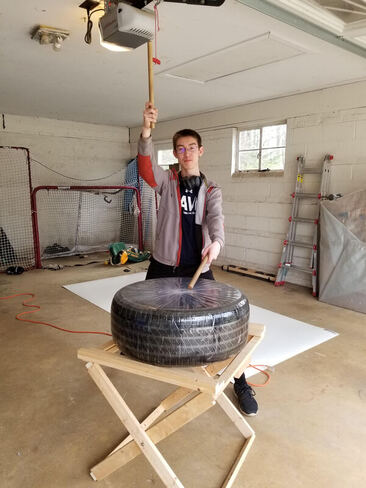 One challenge of playing at home is that we don't have our drums or other instruments in our homes. Ryan, a Dounen Daiko member, was inspired to build his own gomi-daiko and stand from a tire and scrap wood recycled from a box spring. Here are Ryan's detailed instructions for how to build your own gomi-daiko with a tire and scrap wood. 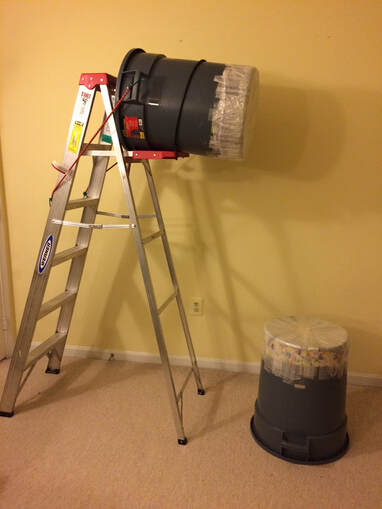 For Nen Daiko's song Chemistry, we need one drum up high and one down low. Nen Daiko member Carla rigged up her ladder and her gomi-daiko to practice this song at home. 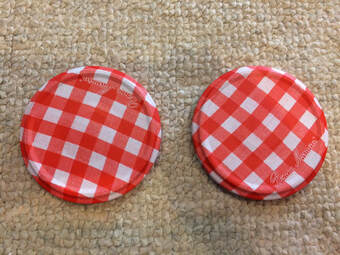 Pretend "chappa" for home practice Pretend "chappa" for home practice For Nen Daiko's song Man'in Onrei, we need to practice playing chappa, or hand-held cymbals, while doing the choreography. We found that holding metal lids in our hands to make a "click" sound at least gave us some sensory feedback while practicing. How Do We Stay Motivated?The author Gretchen Rubin has a framework called the Four Tendencies which explains what motivates people. The tendencies are: 1) Upholders - respond well to expectations that are set both externally and internally 2) Obligers - respond well to rules externally created but can struggle to follow through on goals they set for themselves 3) Questioners - respond well to rules they set for themselves but can struggle to follow externally created goals 4) Rebels - struggle to follow rules set for themselves or by others unless it is tied to their core identity The most common type is Obligers and given that Nen Daiko and Dounen Daiko choose to practice in a performing group with its built-in accountability, chances are many of us are Obligers. When we lose the schedule and company of the group, it is difficult for Obligers to stay motivated. The way we can help Obligers is to use virtual meetings to create accountability, or create other systems such as everyone emailing in a video of themselves practicing. How are you staying motivated to practice taiko or whatever skill you care about? Let us know at [email protected]. The Importance of Emotional and Social SupportWhile it is important to maintain and improve our skills and fitness, we also need to give ourselves a lot of grace. People are working or getting laid off, studying, teaching kids and maintaining households in very new circumstances. We are worrying about our families and friends. A tremendous value of being in a taiko group are the social connections and support. Ekoji Buddhist Temple has been offering virtual Sunday services which is a wonderful way to become more acquainted with Shin Buddhism and to find peace at this time. Our teens noted that they appreciate how we continue our small traditions such as meditating when we start and end practice. This makes life feel more "normal." Dounen Daiko has been learning American Sign Language each week at practice. This week, our member Trevor's mom made a sign for "quarantine" which was the sign for "alone" under the roof of a house. But really, we are not alone - we are together in our love of taiko, thinking about each other as we practice.
Nen Daiko and Dounen Daiko looks forward to when we can reconnect in person with our audiences and other taiko performers! Much #TaikoLove to you all!
0 Comments
|
Archives
October 2023
Categories
All
|
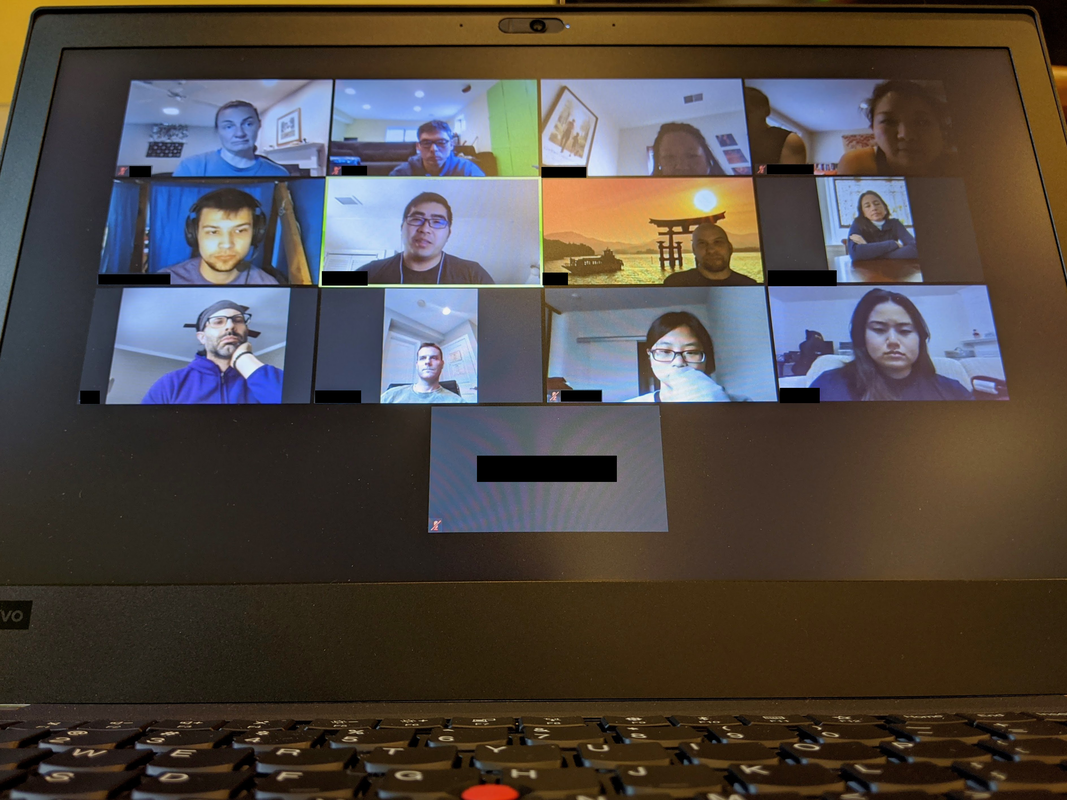
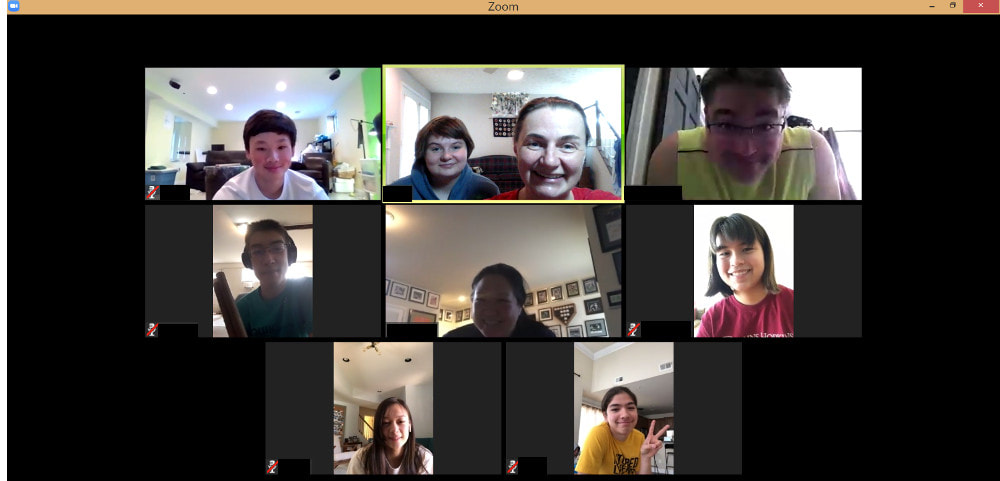
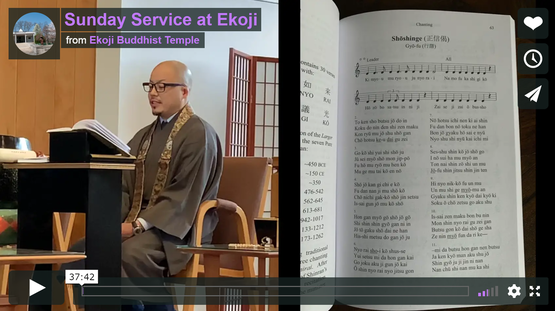
 RSS Feed
RSS Feed